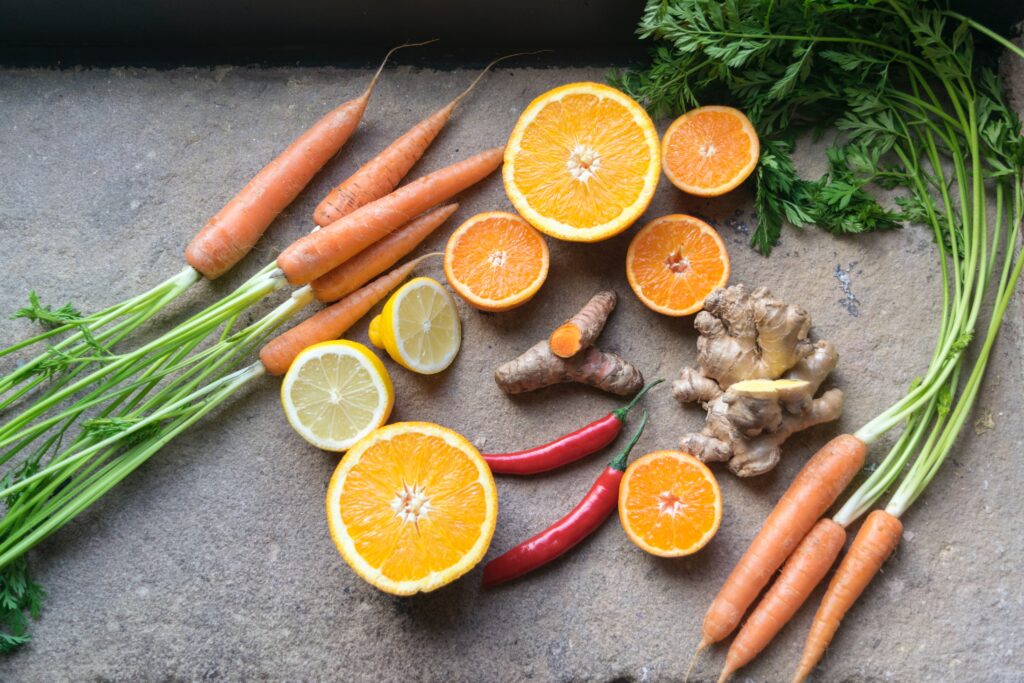
Turmeric and carrot juice have a multitude of health benefits. Combining them into a single juice amplifies the advantages they offer to your body. Before we delve into the delightful recipes, let’s explore the individual benefits of these extraordinary plants.
Benefits of Turmeric Juice
Turmeric, a spice renowned in Asian cuisine, particularly in India and China, has a rich history of use in traditional medicine spanning centuries. This vibrant spice contains curcumin, an active ingredient that has garnered attention for its remarkable anti-inflammatory and antioxidant properties. Use cases of turmeric include cooking, beauty, and garment coloration, and can be used as a natural remedy for some medical conditions.
Here are some potential health benefits of turmeric:
- Reducing Inflammation: Curcumin, found in turmeric, has been the focus of studies demonstrating its ability to quell inflammation. This could be a boon for individuals dealing with inflammatory conditions like arthritis or Crohn’s disease.
- Improving Brain Function: Emerging research suggests that turmeric may enhance memory and cognitive function, particularly in individuals with Alzheimer’s disease.
- Lowering the Risk of Heart Disease: Turmeric may aid in reducing cholesterol levels, potentially mitigating the risk of heart disease.
- Managing Diabetes: Turmeric has shown promise in helping regulate blood sugar levels, offering potential benefits for individuals with diabetes.
- Relieving Pain: Turmeric’s anti-inflammatory properties may effectively alleviate pain, particularly in those suffering from osteoarthritis.
While turmeric boasts numerous potential health benefits, it’s important to note that further research is needed to fully comprehend its effects on the body. Turmeric is generally considered safe for consumption, but individuals can experience allergic reactions. Additionally, turmeric may interact with certain medications, so consult with a healthcare professional before adding it to your diet.
Carrot Juice and Its Health Benefits
Carrot juice, derived from raw carrots, is a treasure trove of nutrients, including vitamin A, vitamin C, and potassium. This delightful elixir not only boasts a sweet and refreshing taste but also offers an array of health benefits.
Here are some potential health benefits of carrot juice:
- Enhanced Vision: Carrots, rich in vitamin A, play a vital role in maintaining healthy eyesight and improving visual acuity.
- Stronger Immune System: The vitamin C content in carrots bolsters the immune system, potentially reducing the severity of colds and other illnesses.
- Skin Protection: Carrots are equipped with antioxidants and other compounds that safeguard the skin from damage, promoting a healthy complexion.
- Blood Pressure Regulation: The potassium in carrots may help regulate blood pressure, reducing the risk of hypertension.
- Digestive Health: Carrots contain fiber, aiding in regular bowel movements and supporting healthy digestion.
It’s essential to consume carrot juice in moderation due to its natural sugar content, and some individuals may have allergies to carrots. If you experience adverse reactions after consuming carrot juice, it’s prudent to discontinue its consumption.
Benefits of Combining Turmeric and Carrots Through Juicing
When turmeric and carrots join forces in a juice, they create a nutritional powerhouse with potential benefits for your well-being. Turmeric’s anti-inflammatory and antioxidant properties synergize with the abundance of vitamins and minerals in carrots, such as vitamin A and vitamin C.
Together, turmeric and carrot juice may offer the following potential benefits:
- Enhanced Immune Function: The combination of vitamin C from carrots and the antioxidants from turmeric may fortify your immune system.
- Reduced Inflammation: The anti-inflammatory effects of turmeric may receive a boost from the nutrients in carrots, potentially reducing inflammation throughout the body.
- Improved Digestion: Carrots’ fiber content, combined with turmeric’s potential digestive benefits, can enhance digestion and promote regular bowel movements.
- Increased Antioxidant Protection: The amalgamation of turmeric and carrots provides an extra dose of antioxidants, safeguarding the body against damage caused by free radicals.
Pro Tip: Before making any dietary changes, consult a healthcare professional. Incorporate turmeric and carrot juice in moderation as part of a balanced diet.
Recipes for Turmeric and Carrot Juice
Ingredients:
- 4–5 carrots
- 1-inch piece of turmeric
- 1-inch ginger slice (optional, for added flavor)
- Optional: honey or maple syrup (to sweeten, if desired)
Equipment Required:
- Blender: Invest in a durable blender for long-lasting use.
- Juicer: A specialized juicer for vegetables will be invaluable for various juice recipes.
- Sieve: A clean cloth will suffice, ensuring your juice is smooth and free of solids.
How to Prepare Turmeric And Carrot Juice:
- Wash and chop the carrots, turmeric, and ginger (if using) into small pieces for ease of handling.
- If you have a juicer, follow the manufacturer’s instructions to juice the carrots, turmeric, and optional ginger.
- If you’re using a blender, blend the carrots and turmeric until smooth. Add some water to the mixture and strain it through a sieve or cheesecloth to remove any solids.
- Add honey or maple syrup to taste, if desired.
- Serve the juice chilled for the best taste and texture. You can refrigerate it for a few hours before serving, or add ice cubes to the glass.
Side Effects of Using Turmeric and Carrot Juice
Turmeric and carrot juice are generally considered safe for most people when consumed in moderation as part of a balanced diet. However, like many foods and beverages, excessive consumption may lead to certain side effects in some individuals. Here are potential side effects to be aware of:
1. Allergic Reactions: Some individuals may be allergic to turmeric or carrots. Allergic reactions can range from mild skin irritation to more severe symptoms like swelling, itching, or difficulty breathing. If you suspect an allergy, discontinue consumption and seek medical advice.
2. Digestive Discomfort: Drinking large quantities of carrot juice, in particular, can lead to digestive discomfort, including bloating and diarrhea. This is often due to the high fiber content in carrots. Start with small amounts to gauge your tolerance.
3. Stomach Upset: Turmeric, when consumed in excessive amounts, may cause stomach upset, including acid reflux or indigestion, in some individuals. It’s advisable to avoid consuming turmeric on an empty stomach.
4. Blood Thinning: Turmeric contains natural compounds that may have blood-thinning effects. While this can be beneficial for some, it may pose risks for individuals already taking blood-thinning medications. Consult with a healthcare provider if you have concerns.
5. Interactions with Medications: Turmeric can interact with certain medications, including anticoagulants, antiplatelet drugs, and drugs that reduce stomach acid. If you’re on medication, especially if it’s critical for your health, consult your healthcare provider before adding turmeric or carrot juice to your diet.
6. Kidney Stones: Carrots are high in oxalates, which can contribute to the formation of kidney stones in susceptible individuals. If you have a history of kidney stones, it’s wise to moderate your carrot consumption.
7. Staining Teeth: Carrot juice, if consumed frequently, can potentially lead to teeth staining due to its vibrant orange color. Regular dental hygiene practices can help mitigate this effect.
It’s essential to listen to your body and practice moderation when consuming turmeric and carrot juice. If you’re unsure about how these juices may affect your health, or if you have underlying medical conditions, it’s always a good idea to consult with a healthcare professional for personalized advice. Additionally, be mindful of the source and quality of the ingredients when preparing your juice to ensure optimal safety and nutrition.
In conclusion, turmeric carrot juice is a delectable and nutritious beverage that harnesses the health benefits of both turmeric and carrots. While turmeric offers anti-inflammatory and antioxidant properties, carrots provide a wealth of essential vitamins and minerals. Together, they enhance immune function, reduce inflammation, improve digestion, and offer increased antioxidant protection. Remember to consult a healthcare professional before making dietary changes, and enjoy turmeric carrot juice in moderation as part of a well-rounded diet. We encourage you to experiment with different ingredients to create your unique blend of turmeric carrot juice and share your thoughts and experiences with friends and family. Your feedback is invaluable as we continue to learn and grow.
FAQ
1. Is it safe to consume turmeric and carrot juice regularly?
- Yes, it’s generally safe to enjoy turmeric and carrot juice as part of a balanced diet. However, moderation is key, especially if you have any existing health conditions. Consult with a healthcare professional for personalized guidance.
2. Can I drink turmeric and carrot juice if I’m pregnant or nursing?
- It’s advisable to consult with a healthcare provider before adding any new foods or beverages to your diet during pregnancy or while breastfeeding.
3. Are there any potential side effects of consuming turmeric and carrot juice?
- While generally safe, excessive consumption of these juices may lead to digestive discomfort or allergic reactions in some individuals. Monitor your body’s response and adjust your intake accordingly.
4. How often should I drink turmeric and carrot juice to reap the benefits?
- Drinking these juices a few times a week can be beneficial. However, individual needs vary, so consider your specific health goals and consult a healthcare professional for personalized advice.
5. Can children consume turmeric and carrot juice?
- Small amounts are generally safe for children. However, it’s best to consult with a pediatrician before introducing these juices into a child’s diet.
6. Should I peel turmeric and carrots before juicing?
- Answer: While peeling is not mandatory, it’s a good practice to wash and scrub them thoroughly to remove dirt and potential contaminants, especially if they’re not organic.
7. Can I combine turmeric and carrot juice with other ingredients for added flavor?
Absolutely! Feel free to experiment with other ingredients like ginger, lemon, or apples to enhance the taste and nutrition of your juice.
8. Is it okay to store turmeric and carrot juice for later consumption?
- Freshly prepared juice is best to retain nutrients, but you can refrigerate it for up to 24 hours. Shake well before drinking if it separates.
9. Are there any contraindications with medications when consuming turmeric and carrot juice?
- Turmeric may interact with certain medications. If you’re on medication, consult with your healthcare provider to ensure there are no potential conflicts.
10. Can turmeric and carrot juice aid in weight loss?
- While these juices are nutritious and low in calories, they should be part of a balanced diet and active lifestyle for effective weight management.


